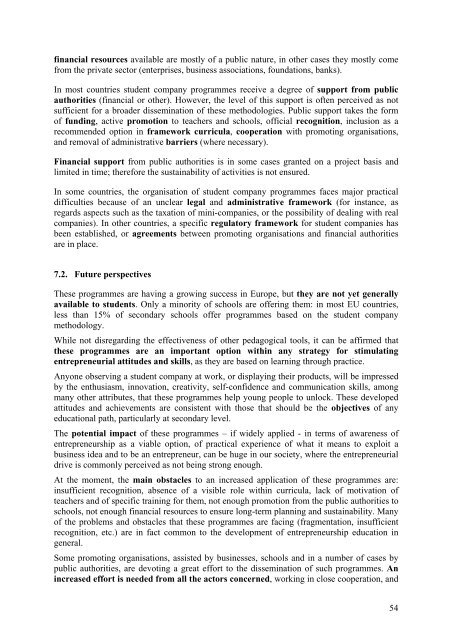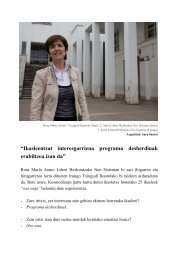Final Report of the Expert Group - European Commission - Europa
Final Report of the Expert Group - European Commission - Europa
Final Report of the Expert Group - European Commission - Europa
Create successful ePaper yourself
Turn your PDF publications into a flip-book with our unique Google optimized e-Paper software.
financial resources available are mostly <strong>of</strong> a public nature, in o<strong>the</strong>r cases <strong>the</strong>y mostly comefrom <strong>the</strong> private sector (enterprises, business associations, foundations, banks).In most countries student company programmes receive a degree <strong>of</strong> support from publicauthorities (financial or o<strong>the</strong>r). However, <strong>the</strong> level <strong>of</strong> this support is <strong>of</strong>ten perceived as notsufficient for a broader dissemination <strong>of</strong> <strong>the</strong>se methodologies. Public support takes <strong>the</strong> form<strong>of</strong> funding, active promotion to teachers and schools, <strong>of</strong>ficial recognition, inclusion as arecommended option in framework curricula, cooperation with promoting organisations,and removal <strong>of</strong> administrative barriers (where necessary).Financial support from public authorities is in some cases granted on a project basis andlimited in time; <strong>the</strong>refore <strong>the</strong> sustainability <strong>of</strong> activities is not ensured.In some countries, <strong>the</strong> organisation <strong>of</strong> student company programmes faces major practicaldifficulties because <strong>of</strong> an unclear legal and administrative framework (for instance, asregards aspects such as <strong>the</strong> taxation <strong>of</strong> mini-companies, or <strong>the</strong> possibility <strong>of</strong> dealing with realcompanies). In o<strong>the</strong>r countries, a specific regulatory framework for student companies hasbeen established, or agreements between promoting organisations and financial authoritiesare in place.7.2. Future perspectivesThese programmes are having a growing success in Europe, but <strong>the</strong>y are not yet generallyavailable to students. Only a minority <strong>of</strong> schools are <strong>of</strong>fering <strong>the</strong>m: in most EU countries,less than 15% <strong>of</strong> secondary schools <strong>of</strong>fer programmes based on <strong>the</strong> student companymethodology.While not disregarding <strong>the</strong> effectiveness <strong>of</strong> o<strong>the</strong>r pedagogical tools, it can be affirmed that<strong>the</strong>se programmes are an important option within any strategy for stimulatingentrepreneurial attitudes and skills, as <strong>the</strong>y are based on learning through practice.Anyone observing a student company at work, or displaying <strong>the</strong>ir products, will be impressedby <strong>the</strong> enthusiasm, innovation, creativity, self-confidence and communication skills, amongmany o<strong>the</strong>r attributes, that <strong>the</strong>se programmes help young people to unlock. These developedattitudes and achievements are consistent with those that should be <strong>the</strong> objectives <strong>of</strong> anyeducational path, particularly at secondary level.The potential impact <strong>of</strong> <strong>the</strong>se programmes – if widely applied - in terms <strong>of</strong> awareness <strong>of</strong>entrepreneurship as a viable option, <strong>of</strong> practical experience <strong>of</strong> what it means to exploit abusiness idea and to be an entrepreneur, can be huge in our society, where <strong>the</strong> entrepreneurialdrive is commonly perceived as not being strong enough.At <strong>the</strong> moment, <strong>the</strong> main obstacles to an increased application <strong>of</strong> <strong>the</strong>se programmes are:insufficient recognition, absence <strong>of</strong> a visible role within curricula, lack <strong>of</strong> motivation <strong>of</strong>teachers and <strong>of</strong> specific training for <strong>the</strong>m, not enough promotion from <strong>the</strong> public authorities toschools, not enough financial resources to ensure long-term planning and sustainability. Many<strong>of</strong> <strong>the</strong> problems and obstacles that <strong>the</strong>se programmes are facing (fragmentation, insufficientrecognition, etc.) are in fact common to <strong>the</strong> development <strong>of</strong> entrepreneurship education ingeneral.Some promoting organisations, assisted by businesses, schools and in a number <strong>of</strong> cases bypublic authorities, are devoting a great effort to <strong>the</strong> dissemination <strong>of</strong> such programmes. Anincreased effort is needed from all <strong>the</strong> actors concerned, working in close cooperation, and54




